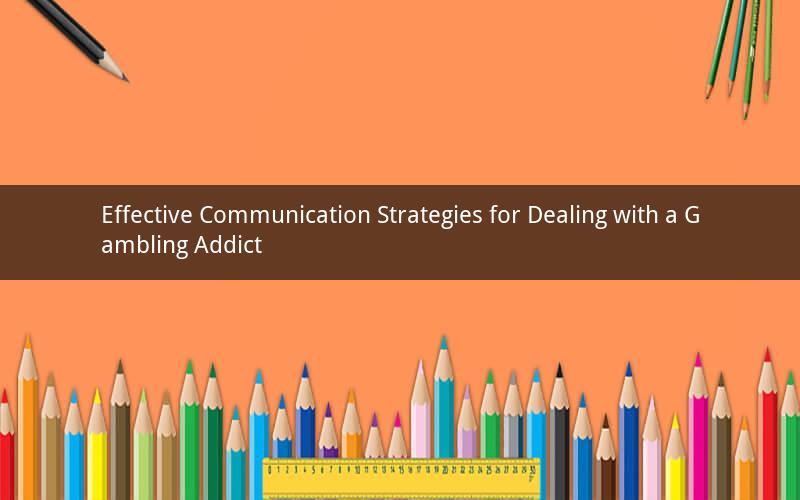
1. Understanding the Problem
Gambling addiction is a complex issue that affects individuals, families, and communities. It is crucial to recognize the signs of gambling addiction and understand the challenges faced by both the addict and their loved ones. By acknowledging the problem, one can take the first step towards finding effective ways to communicate with a gambling addict.
2. Building Trust and Empathy
Communication with a gambling addict can be challenging, as they may be defensive or unwilling to admit their addiction. Building trust and empathy is essential in creating a supportive environment for open dialogue. Here are some tips:
a. Listen actively: Pay close attention to the addict's concerns and feelings without interrupting or judging. This helps them feel understood and valued.
b. Show empathy: Acknowledge the pain and struggles they are going through. Express your understanding that addiction is a disease and not a personal choice.
c. Avoid confrontational language: Use "I" statements instead of "you" statements to avoid sounding accusatory or aggressive. For example, say "I feel worried about you" instead of "You are ruining your life."
3. Setting Clear Boundaries
Establishing boundaries is crucial in helping a gambling addict understand the consequences of their behavior. Here are some guidelines:
a. Communicate your concerns: Clearly explain how their gambling addiction is affecting you and your loved ones. Use specific examples to illustrate the impact.
b. Set realistic expectations: Discuss the changes you expect from the addict, such as seeking help, attending therapy, or limiting their access to gambling.
c. Enforce consequences: If the addict fails to meet the agreed-upon boundaries, be prepared to enforce consequences. This may include limiting contact, seeking professional help, or involving support groups.
4. Encouraging Professional Help
It is essential to encourage a gambling addict to seek professional help. Here are some strategies:
a. Research treatment options: Learn about different types of treatment programs, such as therapy, support groups, and rehabilitation centers.
b. Offer support: Let the addict know that you are willing to accompany them to appointments or support groups.
c. Encourage self-help: Suggest self-help resources, such as books, websites, and online forums, that can provide guidance and support.
5. Maintaining Open Communication
Once the addict starts seeking help, it is important to maintain open communication to ensure their progress. Here are some tips:
a. Express your concerns: Continue to share your worries and feelings, but avoid being overly critical or judgmental.
b. Celebrate successes: Acknowledge the addict's efforts and achievements, no matter how small. This helps reinforce positive behavior.
c. Be patient: Recovery is a long process, and setbacks are common. Stay supportive and encourage the addict to keep trying.
5 Questions and Answers:
1. Q: How can I help my loved one understand the seriousness of their gambling addiction?
A: Share specific examples of how their gambling affects you and your family. Use "I" statements to express your concerns without sounding accusatory.
2. Q: Should I confront my loved one about their gambling addiction?
A: It's essential to approach the conversation with empathy and understanding. Consider using a non-confrontational approach, such as discussing your concerns in a calm and supportive manner.
3. Q: What if my loved one refuses to seek help?
A: Continue to show support and encourage them to seek help. Offer to accompany them to appointments or support groups. If they remain resistant, consider seeking guidance from a professional counselor or therapist.
4. Q: Can I help my loved one overcome their gambling addiction on my own?
A: While you can provide support, it is essential for the addict to take responsibility for their recovery. Encourage them to seek professional help and participate in treatment programs.
5. Q: How can I maintain my own emotional well-being while supporting a gambling addict?
A: It is crucial to take care of yourself during this challenging time. Seek support from friends, family, or support groups for individuals affected by gambling addiction. Consider professional counseling to help you cope with the emotional stress.
By following these communication strategies and maintaining a supportive environment, you can help a gambling addict on their journey towards recovery. Remember, patience, empathy, and understanding are key factors in fostering a positive and constructive relationship.